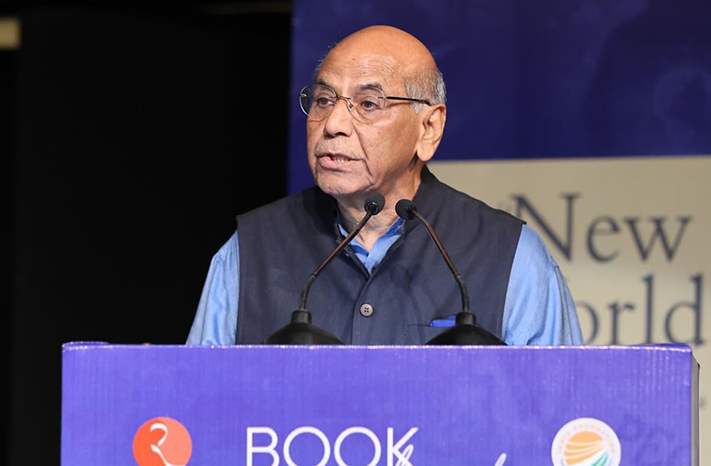
At a moment when the international order teeters on the edge of profound transformation, Ram Madhav’s new book, The New World: 21st-Century Global Order and India, has arrived with striking timeliness. Speaking at its launch, held at the India Habitat Centre on 23rd June 2025, in the presence of the Hon’ble Vice President of India, Shri Jagdeep Dhankhar, former Foreign Secretary, Amb. Shyam Saran hailed the book as an important and timely contribution to national and global discourse.
According to Amb. Saran, the global landscape is increasingly marked by uncertainty, war, economic disruption, and growing human suffering. He cited the continuing tragedies in regions like Gaza and West Asia as urgent reminders of a world in crisis. As he noted, Ram Madhav captures the spirit of the times when he warns of “the dimming of the moral core which defines the larger humanity we are all part of.” The book, said Amb. Saran does more than diagnose the current turmoil—it attempts to illuminate a path forward.
This, he emphasised, is what makes the work so important: it has been published at an opportune, almost prophetic moment. While some may attribute the timing of its release to astrological coincidence, Amb. Saran wryly remarked, “Perhaps there’s some truth in that too—for this book speaks to the uncertainty and anxiety of our times with rare clarity and depth.”
At the heart of The New World lies an ambitious effort to define and interpret the forces shaping the international order in the 21st century. With characteristic insight, Madhav dissects the global disorder and calls for a renewed vision of nationalism—one that is expansive, ethical, and globally aware. In one of the book’s most powerful lines, he asserts: “Nationalism bereft of any internationalism, which recognises our common humanity, is, for me at least, too narrow a concept.” This, according to Amb. Saran, is a reminder that India’s identity and global role must be framed by a balance between national interest and shared moral responsibility.
Amb. Saran praised the book’s intellectual breadth, describing it as a “scholarly tour de force—comprehensive in scope and insightful in analysis.” He noted that Madhav combines the rigour of a political thinker with the curiosity of a social scientist. The volume draws on rich historical references and meticulous research, with extensive footnotes lending further weight to the arguments.
Among the chapters that stood out to the former diplomat was “China: The Roaring Dragon,” which he called a “realistic and sober assessment” of what he termed “perhaps India’s most defining foreign policy challenge” of this century. He also singled out the chapter “Future Shock: The Artificial Intelligence Era,” lauding Madhav’s deep familiarity with emerging technologies like AI and quantum computing. “Technology has truly emerged as a key metric of power,” the author notes, and Amb. Saran agreed: India, he said, must move swiftly if it is to find its place among the technological frontrunners.
The latter part of the book focuses on India’s role in this evolving world order. Amb. Saran echoed Madhav’s conclusion that the post-Second World War liberal, rules-based international system is fading. In the author’s words, it is “in its death throes,” and ironically, its decline is being driven by its own architect—the United States. Yet, as Amb. Saran observed, “This will be a lingering eclipse, not the sudden dawn of a new order.” Instead, we are in the midst of an uncertain transition that may take years, even decades, to resolve.
This vacuum, however, presents opportunities for emerging powers like India to carve out a more assertive role. The book’s reflections on the enduring influence of Western structures—particularly in finance, culture, and institutions—are especially noteworthy. Despite the West’s relative decline, its legacy will continue to shape global affairs, and Indian foreign policy must navigate this complex terrain with clarity and purpose.
The New World also offers a roadmap for India to emerge as a leading power in the decades ahead. While Amb. Saran acknowledged that one might disagree with some of the book’s recommendations, but he stressed that the seriousness and thoughtfulness of Madhav’s proposals cannot be ignored. He also noted that India’s foreign policy is characterised by both change and continuity. While there are shifts in tone and emphasis, the underlying drivers—geography, history, culture, and national temperament—remain deeply rooted and enduring.
Perhaps most importantly, the book offers a much-needed platform for informed dialogue. In an era marked by polarisation and ideological rigidity, The New World encourages readers to engage with complexity, to reflect deeply, and to converse respectfully. Amb. Saran praised this quality, describing the book as an example of “sobriety, not excess; intellectual integrity, not prejudice; and above all, a shared commitment to the India we all love.”
As India finds itself at the heart of a changing global equation, The New World stands as both a mirror and a map—a reflection of the present and a guide to the future. In acknowledging the uncertainty of our times and the responsibility of shaping them, this work reminds us that the task ahead is not merely strategic but profoundly moral.
In congratulating Ram Madhav, Amb. Shyam Saran concluded with the hope that the book would stimulate national reflection and prepare us, as citizens and as a civilisation, for the world that lies ahead.
Leave a Reply